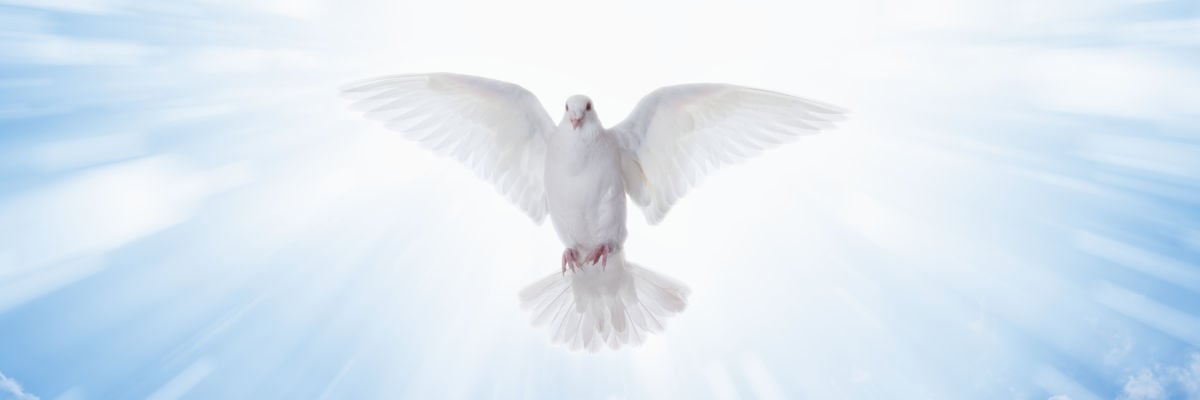
Karlo Broussard tackles the intriguing question of how Jesus’ promise of the Holy Spirit’s coming aligns with His presence in the Eucharist. Discover the distinction between Jesus’ visible presence and His sacramental presence in the Eucharist. Uncover the pivotal role of the Holy Spirit in transforming the bread and wine during Mass, as well as in guiding and strengthening the Church and individuals in their faith.
Transcript:
Yeah, hi. Me and my husband have been investigating the Catholic faith for the past six months, and we were curious just about the Eucharist and the presence of the Eucharist. And when Jesus said that I must go in order that the Holy Spirit comes,
then it feels like he was saying, you know, I’m, but now he’s present in the Eucharist. And so, but I feel like there’s not as much of an emphasis on the Holy Spirit being present. And so when we talk about the sacrament of like, when you talk about adoration and taking of the Eucharist, it just seems of a more important than him leaving and coming back another time and having the Holy Spirit come. So what’s the, I guess my question is, will be the Catholic view of the Holy Spirit’s work in all of that?
Yeah, this is a great question, Mary. I’ve actually never really considered it before, but it’s quite interesting. If I could summarize your question, if I know you’re not posing it as an objection, but it could be posed as an objection, right? So given what our Lord says, it would seem that the Catholic belief in the Eucharist is somehow in conflict with our Lord’s teaching about the Holy Spirit’s work in the church.
So it’s an interesting question. So here, here are my thoughts in response.
My first thought that came to mind as you were articulating your question, Mary, was notice I must go in order for the Holy Spirit to come, but there’s an implied understanding of which sort of presence will no longer be here that will believe that will bring about the coming of the Holy Spirit. And I would argue and we as Catholics would say, it’s our Lord’s visible presence. He must go. He must no longer be visibly present with us walking on this earth, teaching us with his own words, the mysteries of divine revelation. He in this providential plan must ascend and leave this earth, go away from this earth, no longer be visibly present and the Holy Spirit will come and work in our hearts and in the church. But notice that is in no way in conflict with our Lord being present in a different way.
So, and this is key here, Mary, to our understanding of the Eucharist. It is true that we affirm and profess that the Eucharist is the actual real body, blood, soul and divinity of Jesus. But the mode or the way in which his body, blood, soul and divinity is present, especially his body and his blood and his soul, it’s not present in its proper or normal mode like he is, like it is in his glorified body right now. Wherever he’s at in the physical cosmos, his physical body is taking up space. That is not the mode or the manner in which his body is actually truthfully present in the Eucharist. This is why we call it a sacrament. There’s a sacramental presence here, not to say that it’s false or mythical or a figment of our imagination or even just spiritual. It’s an actual presence and that’s why we worship the Eucharist. But notice it’s still different. So our Lord going away, he is no longer present with us in the visible way, in the ordinary way, in the normal way, but he can still be present with us in this sacramental way and it’s still fit with his teaching of sending us the Holy Spirit to guide and lead us. Now, to your question about what’s the Holy Spirit’s role in all this? Well, Mary, I don’t know if you’ve ever attended a Mass before, but when you go to Mass and you listen closely to the words that precede the words, “This is my body, this is my blood,” notice, you will notice that the priest actually invokes the Holy Spirit. We call that the epiclesis, that the Holy Spirit is coming down from on high to operate, to act in time and in history to bring about a miracle, to change that bread and wine into the body and blood of Jesus. So the Holy Spirit, we explicitly invoke to be present and act on that altar at every Catholic Mass and this Catholic belief that the Holy Spirit is what confirms us in the sacrament of confirmation and the Holy Spirit continues to act in us personally and individually. Whenever we’re engaging in acts of faith and hope and charity, it’s the Holy Spirit who’s moving us to engage in those supernatural activities and it’s the Holy Spirit who’s guiding the church and protecting the Pope and his teaching ministry and on and on down the road. So the Holy Spirit, at every point, at every juncture within our theology, the Holy Spirit is present there because at every point the Father is there, at every point the Son is there and because the Father and the Son are all identical to the same divine being, they are all one in my intellect and the divine intellect and the divine will, one in being, you can’t have one without the other.
Hey, thanks for watching. If you like this Catholic Answer, be sure to like, subscribe and check out our live streams Monday through Friday, 3 to 5 p.m. Pacific or find the episode after on YouTube, your favorite podcast platform or our Catholic Answers app.



